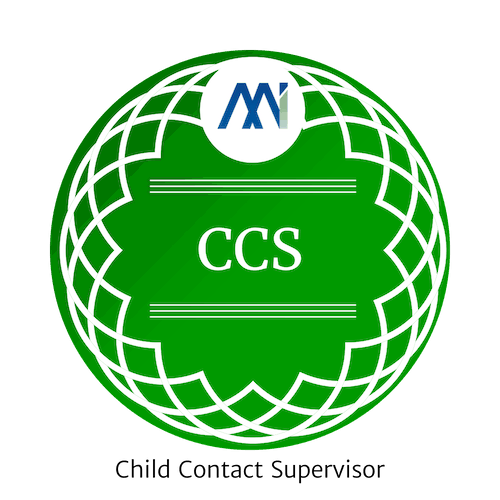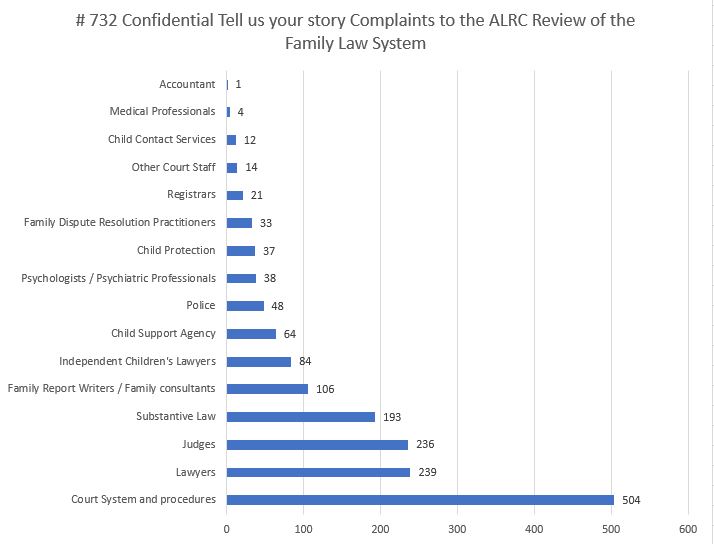Stories of Dissatisfaction from the AFLR
What are the stories of dissatisfaction about?
The Australian Family Law Review was conducted over two years from 2017 to 2019 when the final report was provided to the Australian Attorney General.
As I write this in late June 2019 we are still waiting to see if any of the recommendations are going to be implemented. We hope so as there are clearly areas of dysfunction in the system.
Part of the review involved the opportunity for people to make anonymous contributions called “stories” as well as official submissions. 732 people took this opportunity identifying 16 groups of people or parts of the Family Law System and on average 2.23 complaints per story. We don’t know the actual distribution of the complaints as the information released was very much summarised.
On the 21st June the Australian Law Reform Commission sent out an email with detail from the “Telling our Stories” submissions in a document called Explanatory Note 2.
The Family Law Act 1975 Section 121 (1) prohibits people from publishing details of Family Law Proceedings meaning that people sharing stories of their cases risked breaking their law. For this reason the submissions were collected anonymously and will only be released in summary format.
There were 732 complaints about the Family Law system and professionals who work within it.
Summary of the types of issues people have
The 8 page report identifies a number of issues that clients have also identified to us including a lack of accountability of the court system in terms of complaint handling.
While it is clearly heavily summarised it makes interesting reading for those of us who are interested in supporting the users of the family law system to minimise the negative impacts caused by the system as they work to sort out their parenting and property issues after separation.

Looking Inward: The Art of Reflective Practice
Due to the confidential nature of dispute resolution reflective practice is an essential life skills for dispute resolution practitioners to develop.

Corporate Membership
Corporate Members can use the Mi Members portal to update their business information and directory listing directly. Find out more about our Corporate Membership.

Australian Mediator and Dispute Resolution Accreditation Standards AMDRAS Information and Updates
Information for Mediation Institute Members about the transition from NMAS to AMDRAS Mediator Registration Standards.
Complaints about Family Dispute Resolution Practitioners and Child Contact Services.
There were 33 complaints about Family Dispute Resolution Practitioners and 12 about Child Contact Services.
While only 5% and 2% of the complaints compared to 69% mentioning the family court system and processes it is data that we need to pay attention to as an industry.
See below for the types of things that they complained about according to the note released.
Complaints about FDRP’s
1 Biased
2 Mediators are ineffective in facilitating agreement
3 Vulnerable parties are not adequately protected in mediation

All three of these touch on core responsibilities that FDRP’s have so it is an opportunity to reflect on our practices.
Bias
Are we giving clients the perception of bias that is leaning towards one side or the other in our facilitation, words or actions?
We know that high conflict people seek to blame anyone but themselves but it is always important to reflect on our facilitation of the process.
Role
Are we complying with our obligations to explain our role to clients?
The role of the mediator is to facilitate the process for the parties to help them to make the decisions they need to make about caring for their children and dividing up their property (in the family law context).
Protecting vulnerable parties
Are we complying with Regs. 25 and doing appropriate assessments of suitability or are we letting other factors determine our approach? Are we adapting the process to the needs of clients?
We have a mandated responsibility to assess for risk and to determine suitability imposed by our ethical obligations and the Family Law (Family Dispute Resolution Practitioners) Regulations 2008.
All FDRP have an obligation to understand the history family violence, if any, and how it presents and to assess the emotional, psychological and physical health of participants of the process before proceeding and to make appropriate adjustments to meet the needs of clients or not to proceed as the case may be.
Complaints about Child Contact Services
1 Charge high fees for supervised visits, which can be prohibitive for some parents
2 Staff behave unprofessionally and unethically
3 Inadequate avenues for complaints in respect to private operators

The first of these touches on a dysfunction in the system where those who can afford private fees take up funded places in the system causing waiting lists. The other two may relate to inadequate training, oversight and complaint handling in the industry.
That said there were relatively few complaints about child contact services compared to other parts of the sector.
Fees
Costs have to be recovered so unless the government gets even more generous with funding or means testing was introduced there is not much to be done about this.
Ethical and Professional Standards
Are staff fully aware of their legal and ethical obligations and are they complying with them?
This is one of the important roles of employers and membership associations. We need to make sure that as standards and legal obligations change that staff keep up.
Sometimes we come across people who have an “I’ve been doing this for years” attitude which blinds them of the fact that what was acceptable practice years ago may very well be at best unprofessional and at worst illegal.
Complaint Handling
Do all child contact services have an independent complaint handling service?
Independent complaint handling is part of the professionalisation of any industry and the child contact service industry is no different.
From the 1st July 2019 Mediation Institute will begin offering independent complaint handling for the Child Contact Services Sector as part of a new membership category.


